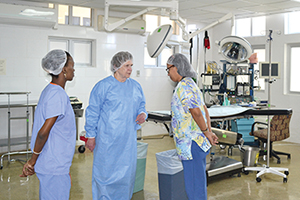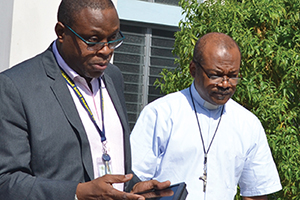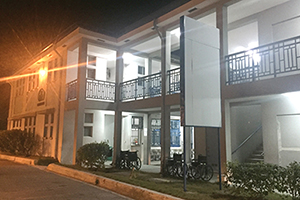ER open, ICU coming soon
By JULIE MINDA
St. Francis de Sales Hospital in Port-au-Prince, Haiti, has made much progress since its August 2015 opening in ramping up services and now provides both inpatient and outpatient care. CHA executives visited the facility in late January as part of a delegation representing U.S. Catholic ministries.

Sr. Carol Keehan, DC, CHA president and chief executive officer, tours an operating room at St. Francis de Sales Hospital guided by Corrioland Chantal, left, head of the surgery department, and Dr. Johanne Duchatelier, right, head of the department of anesthesiology.
"The people at the hospital are very grateful for what has been given, and they look forward to continuing their relationship with CHA and its members," said Sr. Carol Keehan, DC, CHA president and chief executive officer. CHA members contributed more than $10.1 million to a campaign to rebuild the hospital.
Founded more than 126 years ago, St. Francis was destroyed in a Jan. 12, 2010, 7.0 magnitude earthquake that killed more than 220,000 people, injured about 300,000 and displaced approximately 1.5 million. The hospital had been the primary health care provider for the poorest and most vulnerable people in Port-au-Prince, according to Sr. Carol.

Dr. Laure Adrien, left, head of the hospital's maternity department, and Msgr. Serge Chadic help host the delegation of U.S. Catholic ministry representatives. Msgr. Chadic is one of the hospital's managing directors.
In the aftermath of the earthquake, CHA, Catholic Relief Services and the Archdiocese of Port-au-Prince agreed to collaborate to rebuild and reopen the hospital.
CRS oversaw the construction project. The 200-bed, 125,000-square-foot hospital opened about a year and a half ago. The archdiocese owns and runs the facility. The hospital's nine-building complex includes internal medicine, pediatric, maternity and surgery units; an outpatient clinic; a morgue; a cadaver laboratory; administrative offices; a chapel and housing for some staff. The hospital has semiprivate patient rooms, as well as four- to six-person wards. The hospital opened an emergency department in December and was preparing to open an intensive care unit as Catholic Health World went to press.
The facility welcomes both private-pay and charity care patients.
Since the St. Francis replacement hospital opened a year and a half ago, the archdiocese has put in place a triad of managing directors, who are working well together, according to Bruce Compton, CHA senior director of international outreach. He was a member of the delegation visiting the facility early this year. Compton said during his visit he noted that "a collegial environment has developed among the directors general and the heads of departments."

The hospital campus at night.
He said, "This environment allows the heads of the departments the opportunity to voice their opinions regarding the needs of the hospital as they continue to move forward, which provides information necessary for the directors general to make informed decisions that are in the best interest of the hospital."
The three managing directors are Msgr. Patrick Aris, Msgr. Serge B. Chadic and Rev. Pere Roland Vilfort.
Currently the hospital is looking at how best to financially sustain its operations over the long term. It plans to add new laboratory and imaging services, which hospital administrators believe will provide an ongoing source of income. Administrators also are looking at how best to fund training initiatives for clinical staff members.
CHA was part of the joint steering committee for St. Francis, which met regularly during the facility's construction. The steering committee also included representatives of the Archdiocese of Port-au-Prince; University of Notre Dame of Haiti; Catholic Relief Services; and Sur Futuro Foundation, a foundation based in the Dominican Republic.
The U.S. Agency for International Development also donated funds to rebuild the hospital. According to US AID, 40 percent of the population of Haiti lacks access to essential health and nutrition services. The World Bank says nearly 60 percent of Haitians live below Haiti's poverty line, which is $2.42 per day in U.S. dollars.
Copyright © 2017 by the Catholic Health Association
of the United States
For reprint permission, contact Betty Crosby or call (314) 253-3490.